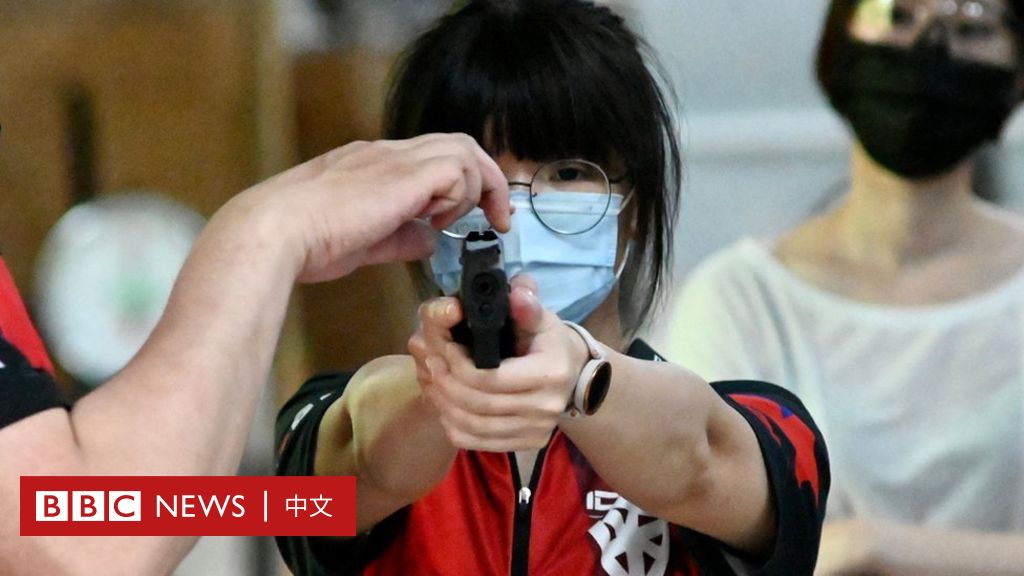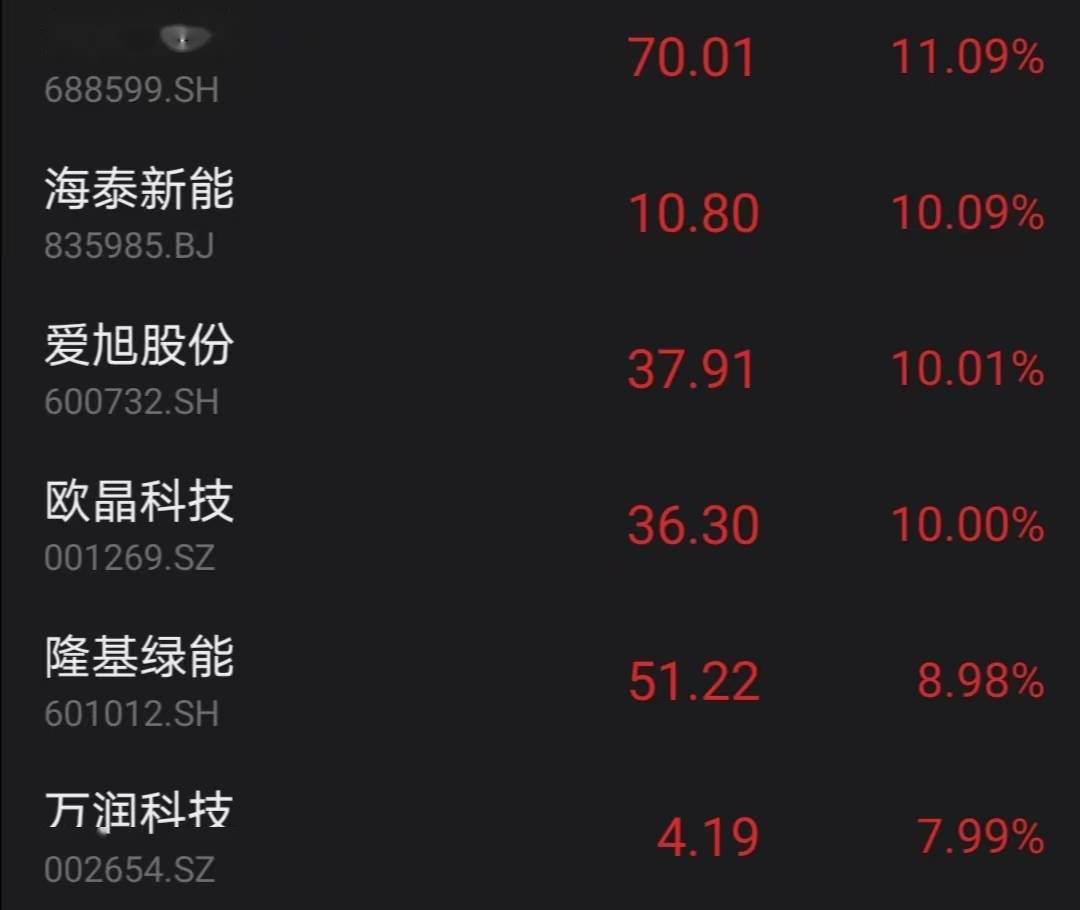- Francesca Mao
- BBC correspondent
October 14, 2022 at 1:40 am
image source,EPA
Cao Xingcheng, 75, said he wanted the Taiwanese to realize that a threat was coming.
In September, Robert Tsao, a retired Taipei billionaire from the tech world, called the island’s media for a press conference. With white hair and white eyes, he said he would spend Taiwan $ 1 billion (£ 28 million, $ 32 million) to build a civilian army.
Cao Xingcheng, wearing a bulletproof vest and work shirt, said he wanted to help his fellow citizens resist China.
Its goal is to produce 3 million civilian “fighters” within three years, one seventh of Taiwan’s population. Office workers, students, shopkeepers, parents can learn how to handle a gun; he wants 300,000 sharpshooters.
He admits the task is daunting, but he firmly believes he can do it.
He waved a photo of his new Taiwanese ID, which he reapplied after giving up his Singapore passport. She said she wasn’t trying to escape. She is not afraid.
“I think that as long as people are in Taiwan, they will be willing to defend their country. They are not afraid of Chinese military aggression,” Cao Xingcheng told the BBC a few weeks later.
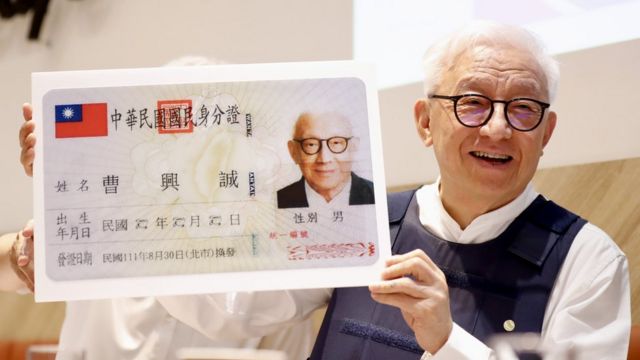
image source,EPA
Cao Xingcheng is holding his new Taiwan ID card.
Born in mainland China but raised in Taiwan, Cao Xingcheng made his fortune in the industry that now makes Taiwan world famous by founding the semiconductor company United Microelectronics Corp.
As a businessman, he has a lot of business in China. He is also an avid history student and has been a high-profile voice in political debates for decades. In 2007 he supported a referendum on reunification with the mainland.
But now, like a growing number of Taiwanese, they see the need to prepare for a possible invasion.
Chinese Communist Party leader Xi Jinping is about to enter his third term, something that hasn’t happened since Mao Zedong, the founding president of the Communist Party, came to power. Achieving what Xi Jinping has called his goal of “unification” with Taiwan would end his legacy.
His decade in power saw modernization and tremendous expansion of Chinese military capabilities. The People’s Liberation Army has increased its activities around the Taiwan Strait.
For decades, Taiwanese have grown accustomed to forcibly intimidating mainland China.
But Beijing’s crackdown on Hong Kong in 2019 shattered some peace of mind. Pro-China voices have long used “one country, two systems” in Hong Kong as a model for Taiwan’s reunification with China, believing it would preserve democracy.
Cao Xingcheng said the alarm sounded again this year. The Russian invasion of Ukraine reverberated in Taiwan.
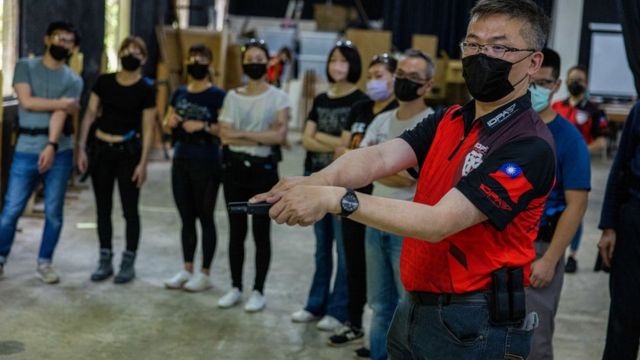
image source,Getty Images
More and more Taiwanese are receiving firearms training.
Tensions across the Strait reached their highest level in decades when US House Speaker Nancy Pelosi visited Taiwan in August.
China responded with force exercises. It’s not just about intimidation; analysts say Beijing has specifically tried how to attack Taiwan.
More than 100 aircraft, 10 destroyers and support vessels have been operating around Taiwan for more than a week. China sent submarines and aircraft carriers and launched dozens of missiles.
For Cao Xingcheng, this was a turning point. He began to see the ruling Chinese Communist Party as “the mafia, a criminal group masquerading as a state government”.
“I want to show my commitment … I will encourage many people and other business people or leaders who might come after me.”
The billionaire has also pledged to invest in the development of military drones, which are key to Taiwan’s “porcupine” defense strategy.
Taiwan’s defense budget is 2% of GDP. The US has sold $ 23 billion (£ 21 billion) worth of weapons to Taiwan since 2010, of which $ 6 billion has been sold since 2020 alone. But China spends at least 15 times that amount. Beijing commands the largest navy in the world and the People’s Liberation Army has more than 2 million soldiers and more than 500,000 soldiers in reserve.
Therefore, Taiwan is focusing on asymmetric defense.
“Today’s war, like the one we have seen in Ukraine, is not about the number of soldiers or tanks. It is almost an intelligence-driven war,” said Cao Xingcheng.
War also requires persistence and a willingness to fight. The Taiwanese military has shrunk since the 1990s, and over the years the government has reduced the compulsory service period from two years to four months. There is a lively debate in society about whether to extend the length of service. Opinion polls show majority support, the first time such a situation has occurred in decades.
After Pelosi’s visit to Taiwan, Cao Xingcheng asked around and founded Kuma Academy, a civil defense training institute founded in 2021. Cao Xingcheng vowed to expand the scale.
“Cao Xingcheng is not alone. He is a mirror that reflects our society and our current situation,” said Wang Dingyu, a Taiwanese lawmaker and member of the Legislative Yuan Foreign Affairs and Defense Committee.
Taiwanese are eager to learn. They even flew to the US territory of Guam, where they practiced shooting real guns, given the strict local gun laws.
These are “hot business,” Wang Tingyu said. “Especially among the younger generations, they are eager to learn how to protect our country”.
Claire Lee, 27, describes herself as a patriot willing to stay and defend her homeland. But she doesn’t think a threat from China is imminent and she says she will receive training from Cao Xingcheng.
“Everyone said, wow, he’s got the nerve. We didn’t expect anyone to do that and give a lot of money. In Taiwan, most of the rich and powerful people, other billionaires, are very pro-China, Support business.”
“So everyone is talking. But I haven’t heard of anyone actually doing it, and I don’t think I will either.”
“Until a gun is pointed at your face,” he said, people don’t want to think the worst.
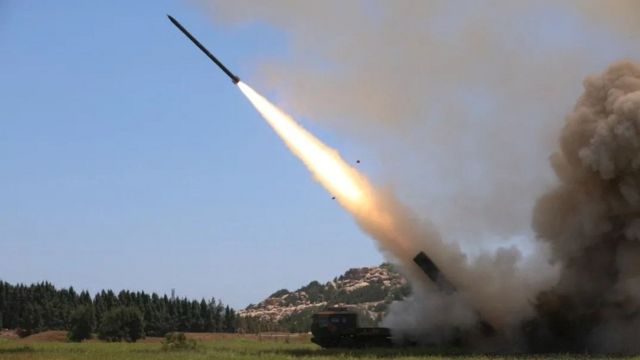
image source,PLA
After Pelosi’s visit to Taiwan, China has deployed warplanes and military ships around Taiwan.
“Most people say we don’t want to go to war, we don’t want reunification (with China) or forced independence. We just want to get on with our lives,” he said.
But he admitted that things were changing much faster than expected. She is now “fairly certain” that Taiwan’s status can be resolved in her lifetime, most likely through war.
Despite the ambiguity of official US policy, US President Joe Biden has repeatedly stated that US troops will help Taiwan defend against attacks from mainland China.
Ma Cao Xingcheng said the Taiwanese must save themselves.
“My job is to give Taiwanese self-confidence,” he said. “In Chinese, I’m the brick in ‘Throwing a brick to attract jade’.”
Cao Xingcheng sees his huge donation as a humble brick.
The jade he wants has a greater value: the fighting spirit of the Taiwanese.
